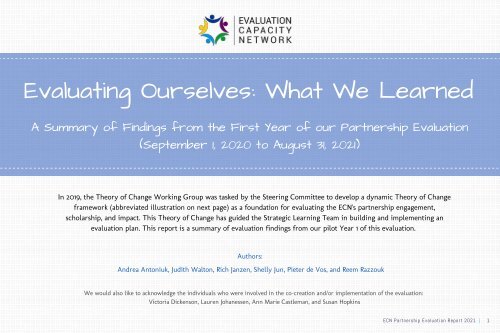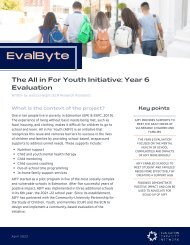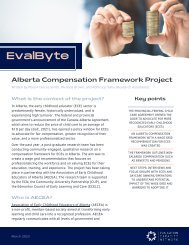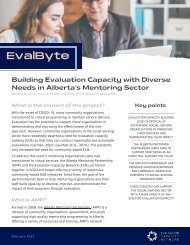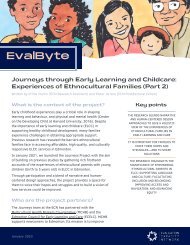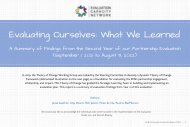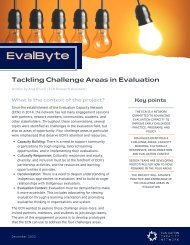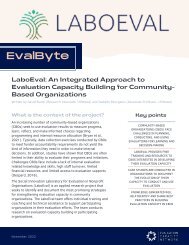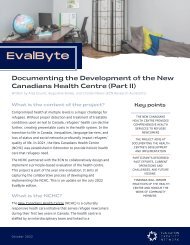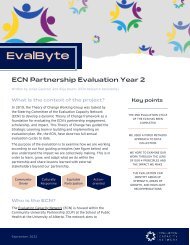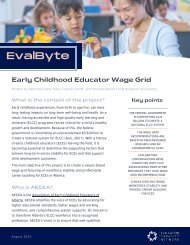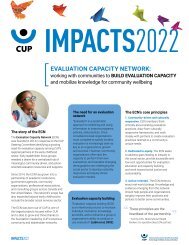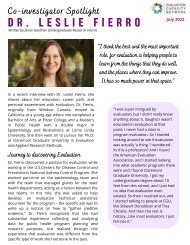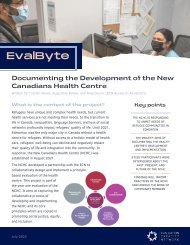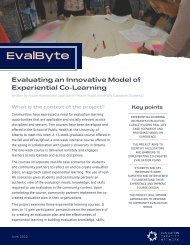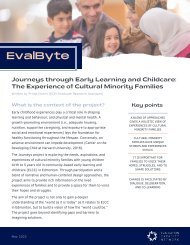Partnership Evaluation Report (2020-2021)
You also want an ePaper? Increase the reach of your titles
YUMPU automatically turns print PDFs into web optimized ePapers that Google loves.
Evaluating Ourselves: What We Learned<br />
A Summary of Findings from the First Year of our <strong>Partnership</strong> <strong>Evaluation</strong><br />
(September 1, <strong>2020</strong> to August 31, <strong>2021</strong>)<br />
In 2019, the Theory of Change Working Group was tasked by the Steering Committee to develop a dynamic Theory of Change<br />
framework (abbreviated illustration on next page) as a foundation for evaluating the ECN's partnership engagement,<br />
scholarship, and impact. This Theory of Change has guided the Strategic Learning Team in building and implementing an<br />
evaluation plan. This report is a summary of evaluation findings from our pilot Year 1 of this evaluation.<br />
Authors:<br />
Andrea Antoniuk, Judith Walton, Rich Janzen, Shelly Jun, Pieter de Vos, and Reem Razzouk<br />
We would also like to acknowledge the individuals who were involved in the co-creation and/or implementation of the evaluation:<br />
Victoria Dickenson, Lauren Johanessen, Ann Marie Castleman, and Susan Hopkins<br />
ECN <strong>Partnership</strong> <strong>Evaluation</strong> <strong>Report</strong> <strong>2021</strong> | 1
Early Childhood Practices, Programs, and Policies<br />
A <strong>Partnership</strong><br />
Theory of Change<br />
Taking part in<br />
our projects<br />
leads to...<br />
ENGAGEMENT<br />
KNOWLEDGE &<br />
SKILLS CREATED<br />
ACTION &<br />
IMPACT<br />
LEGEND<br />
Research<br />
Questions<br />
How will we<br />
get there?<br />
GUIDING<br />
PRINCIPLES<br />
1. Community Driven<br />
2. Culturally Responsive<br />
3. Equitable Participation<br />
4. Action-oriented<br />
OUR GOAL<br />
To develop community-driven and<br />
culturally responsive approaches for<br />
producing and using evidence to improve<br />
early childhood practice, programs, and<br />
policy towards system effectiveness.<br />
OUR OBJECTIVES<br />
Objective #1<br />
Deepen understanding<br />
through engagement<br />
and collaboration to<br />
ensure that evaluations<br />
are community- driven<br />
and culturally<br />
responsive.<br />
How do we ensure that the demand<br />
for, creation, and use of evidence are<br />
community-driven and culturally<br />
responsive?<br />
Greater capacity<br />
in ensuring that<br />
research<br />
collaboration is<br />
communitydriven<br />
Objective #2<br />
Co-create and<br />
implement research<br />
and evaluation that<br />
is mutually<br />
beneficial to all ECN<br />
partners.<br />
Building authentic<br />
partnerships and<br />
collaborations<br />
Greater capacity<br />
in ensuring<br />
equitable<br />
participation of<br />
stakeholders in<br />
research<br />
collaboration<br />
Objective #3<br />
Develop an <strong>Evaluation</strong> Hub<br />
that connects people to<br />
evaluation resources, learning,<br />
and support to mobilizes<br />
knowledge and build<br />
evaluation capacity in the early<br />
childhood field.<br />
How do we increase knowledge,<br />
skills, and motivation to create<br />
& use meaningful evidence<br />
through innovative capacity<br />
building approaches?<br />
Training and<br />
mentoring<br />
Greater<br />
capacity for<br />
ongoing colearning<br />
Greater<br />
capacity in<br />
using evidence<br />
Partners<br />
Research and<br />
evaluation<br />
projects<br />
Greater<br />
capacity in<br />
creating<br />
quality/useful<br />
evidence<br />
ECN<br />
Increased access to and use of<br />
evaluation resources<br />
Lasting connections<br />
Deepened community of practice<br />
How do we increase the value<br />
and use of evidence for decision<br />
making to improve practice,<br />
programs, and policy?<br />
Greater<br />
mobilization of<br />
people<br />
<strong>Evaluation</strong> Field<br />
Increased<br />
understanding of<br />
community-driven<br />
and culturally<br />
responsive evaluation<br />
Knowledge<br />
mobilization<br />
Greater<br />
mobilization of<br />
evidence<br />
Greater value<br />
and use of<br />
evidence in<br />
decision-making<br />
across<br />
stakeholders<br />
Early Years Sector<br />
Increased culture of<br />
learning and use of<br />
evidence<br />
Improved outcomes<br />
in early childhood<br />
Activities<br />
Outcomes<br />
ULTIMATE<br />
OUTCOMES<br />
More innovative early<br />
childhood practices,<br />
programs, and<br />
policies<br />
Greater system<br />
effectiveness in<br />
improving early<br />
childhood outcomes<br />
ECN <strong>Partnership</strong> <strong>Evaluation</strong> <strong>Report</strong> <strong>2021</strong> | 2
PARTNERSHIP EVALUATION: YEAR 1<br />
1<br />
Purpose<br />
The purpose of this evaluation is to:<br />
Examine how we are working according to our<br />
four guiding principles (community-driven, culturally<br />
responsive, equitable participation, action-oriented).<br />
Understand the impact we are collectively making.<br />
This is in order to learn, grow, and adapt what we do (within the<br />
partnership) and share lessons learned with external<br />
stakeholders (beyond our partnership).<br />
<strong>Evaluation</strong> Questions<br />
To what extent are our partnership’s activities (engaging<br />
communities, co-creating/co-learning, and EvalHub<br />
capacity building) aligned to our four guiding principles<br />
(community-driven, culturally responsive, equitable<br />
participation, action-oriented)?<br />
Data Sources<br />
Student Reflective Diaries<br />
Comprised of 4 open-ended questions submitted online.<br />
Students responded using text, pictures, or mind maps (see the appendix for<br />
sample mind maps created by students!).<br />
Data collection: December <strong>2020</strong> - August <strong>2021</strong> (n = 15)<br />
Meeting Minutes<br />
Reviewed meeting minutes from all ECN working groups and committees to<br />
triangulate themes.<br />
Data collection: September <strong>2020</strong> - August <strong>2021</strong><br />
Post-Meeting Surveys<br />
Responses were submitted online after Knowledge Exchange Working Group<br />
and Steering Committee meetings.<br />
Data collection: September <strong>2020</strong> - August <strong>2021</strong> (n = 27 responses).<br />
2<br />
3<br />
4<br />
How, and to what extent, are we effectively building<br />
capacity both internally as we equip ourselves to do our<br />
work, and externally as we mobilize what we are learning<br />
with others?<br />
How, and to what extent, is our partnership’s work<br />
reaching our ultimate goal to improve early childhood<br />
practice, programs, and policy towards system<br />
effectiveness? How are our collective efforts contributing<br />
to the development of children in Canada?<br />
What can we do to improve the effectiveness of our<br />
partnership in meeting our desired outcomes? What are<br />
we learning about how to carry out such a partnership?<br />
Researchers (14.81%) Leaders/Managers (7.41%)<br />
Funder (1.85%) Students (24.07%) Academics (42.59%)<br />
Private Sector (1.85%) Non-pro t Sector (7.41%)<br />
ECN <strong>Partnership</strong> <strong>Evaluation</strong> <strong>Report</strong> <strong>2021</strong> | 3
<strong>Evaluation</strong> question 1: To what extent are our partnership's activities (engaging communities, co-creating/co-learning, and EvalHub capacity<br />
building) aligned to our four guiding principles (community-driven, culturally responsive, equitable participation, action-oriented)?<br />
Community-driven &<br />
Culturally Responsive<br />
Respondents strongly agreed about the need to build a shared understanding of community-driven<br />
and culturally responsive principles. Literature reviews are one way to begin understanding how<br />
these concepts and principles are articulated; consequently, we are conducting a series of scoping<br />
reviews to unpack some of these principles.<br />
Equitable Participation<br />
There was strong agreement that efforts in engagement and collaboration<br />
promoted equitable participation. Respondents felt that they were:<br />
Action Orientation<br />
Respondents mentioned that having structure helped<br />
to facilitate productive meetings, progress towards goals, and<br />
remain action-oriented. Structure was achieved through:<br />
...able to speak their<br />
minds and be heard.<br />
...able to give input that<br />
contributed directly to<br />
progress.<br />
pre-work<br />
before<br />
meetings<br />
...actively engaged in<br />
providing input.<br />
... especially engaged when they<br />
were put in breakout rooms for<br />
discussions.<br />
...in an inclusive<br />
environment where<br />
students and new<br />
attendees were welcome<br />
to give input.<br />
goals and<br />
timelines<br />
meeting<br />
agendas<br />
having difficulty participating when they had to transition<br />
in and out of projects at different stages of progress.<br />
shared documents and slide decks<br />
ECN <strong>Partnership</strong> <strong>Evaluation</strong> <strong>Report</strong> <strong>2021</strong> | 4
<strong>Evaluation</strong> question 2: How and to what extent are we effectively building capacity both internally as we equip ourselves to do our work,<br />
and externally as we mobilize what we are learning with others?<br />
Capacity Building<br />
Respondents identified that we are building capacity by:<br />
Transferability<br />
Students agreed that through their roles within the ECN, they are<br />
building capacity in the following areas:<br />
adapting<br />
to<br />
working<br />
remotely.<br />
figuring out<br />
what we can<br />
do as a<br />
partnership.<br />
reaching a<br />
common<br />
understanding of<br />
how to engage<br />
stakeholders.<br />
academic skills<br />
evaluation skills<br />
stakeholder<br />
engagement skills<br />
collaborating<br />
in new ways<br />
(e.g., shared<br />
documents,<br />
breakout<br />
rooms).<br />
Graphic submitted in a<br />
student reflective diary<br />
We recognize that these findings predominantly reflect how we<br />
are building capacity internally (i.e., equipping ourselves to do our<br />
work). Forthcoming years of our partnership evaluation will focus<br />
on both our internal and external capacity building.<br />
There were mixed responses about the perceived impact of<br />
the skills gained. While some students expressed uncertainty that<br />
their skills will transfer outside of academia, others felt confident<br />
they would be able to apply the skills they have learned to<br />
support early childhood development. Many reported a new<br />
or renewed interest in community-based evaluation and research.<br />
ECN <strong>Partnership</strong> <strong>Evaluation</strong> <strong>Report</strong> <strong>2021</strong> | 5
<strong>Evaluation</strong> question 3: How and to what extent is our partnership's work reaching our ultimate goal to improve early childhood practice,<br />
programs, and policy towards system effectiveness? How are our collective efforts contributing to the development of children in Canada?<br />
What Students Are Saying...<br />
Some students are not certain how their work<br />
contributes to the broader ECN initiative.<br />
Other students found that the larger network<br />
meetings help them to see where they fit in.<br />
Progress<br />
There is an overall sense of progress towards our<br />
ultimate goal, due to building foundations in terms of<br />
capacity building, communications, and shared<br />
understandings. Specifically, respondents mentioned:<br />
connecting with the<br />
larger network<br />
building general capacity<br />
by sharing knowledge and<br />
information<br />
clearer communications<br />
(e.g., website content)<br />
building a shared understanding of<br />
our goals and values<br />
ECN <strong>Partnership</strong> <strong>Evaluation</strong> <strong>Report</strong> <strong>2021</strong> | 6
<strong>Evaluation</strong> question 4: What can we do to improve the effectiveness of our partnership in meeting our desired outcomes? What are we<br />
learning about how to carry out such a partnership?<br />
Engagement<br />
Intentionality<br />
There was strong agreement that we can further<br />
improve our effectiveness by increasing<br />
accessibility, connections, and clarification.<br />
Respondents suggested:<br />
Multiple means for contributing to projects<br />
and accessing information.<br />
Connecting with more individuals and<br />
organizations from the early childhood field.<br />
Obtaining feedback from outside of our<br />
"bubble".<br />
Defining and clarifying engagement in terms<br />
of what we are inviting people to do.<br />
Some students specifically asked for more:<br />
Opportunities to apply their skills in<br />
community settings.<br />
Methods of connecting with others in the<br />
network (e.g., students, community groups).<br />
Updates about the work that everyone is<br />
doing to progress towards our ultimate<br />
outcome.<br />
Structure<br />
Recommendations for<br />
maintaining structure, which<br />
respondents felt was beneficial to<br />
productivity and progress,<br />
included:<br />
meeting agendas<br />
strategies for when members cannot<br />
attend meetings<br />
more meeting updates on the<br />
progress of the network<br />
clearer expectations, goals, and task<br />
lists for students<br />
There was strong consensus about the value<br />
of using language and communications more<br />
intentionally. Respondents suggested:<br />
Building a working<br />
group for systematic<br />
communication and<br />
knowledge<br />
mobilization.<br />
Reaching a shared<br />
understanding of<br />
community-driven and<br />
culturally responsive<br />
practices.<br />
Using communications<br />
to show the<br />
connections between<br />
students and the<br />
partnership.<br />
ECN <strong>Partnership</strong> <strong>Evaluation</strong> <strong>Report</strong> <strong>2021</strong> | 7
CONCLUSIONs<br />
In the first year of our partnership evaluation....<br />
What have we done well?<br />
We created strong foundations that include engagement and equitable<br />
participation, capacity building, and connecting with the larger network.<br />
We utilized an action orientation that was supported by strategies for<br />
promoting and maintaining structure.<br />
Join us next year<br />
as we keep learning<br />
together!<br />
What are some areas for growth?<br />
Continue to promote engagement, especially among students and<br />
those who work in the early childhood development field.<br />
Continue to build structure to maintain and increase effectiveness.<br />
Reach shared understandings about key concepts such as communitydrive<br />
and culturally responsive practices.<br />
Improve communication across the partnership.<br />
ECN <strong>Partnership</strong> <strong>Evaluation</strong> <strong>Report</strong> <strong>2021</strong> | 8
APPENDIX: STUDENT REFLECTIVE DIARY ENTRY SAMPLE<br />
Networking<br />
ECN <strong>Partnership</strong> <strong>Evaluation</strong> <strong>Report</strong> <strong>2021</strong> | 9
APPENDIX: STUDENT REFLECTIVE DIARY ENTRY SAMPLE<br />
ECN <strong>Partnership</strong> <strong>Evaluation</strong> <strong>Report</strong> <strong>2021</strong> | 10


